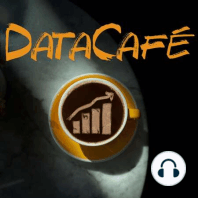39 min listen
Forecasting Solar Radiation Storms
FromDataCafé
ratings:
Length:
40 minutes
Released:
Oct 19, 2020
Format:
Podcast episode
Description
What are solar storms? How are they caused? And how can we use data science to forecast them?In this episode of DataCafé we talk about the Sun and how it drives space weather, and the efforts to forecast solar radiation storms that can have a massive impact here on Earth. On a regular day, the Sun has a constant stream of charged particles, or plasma, coming off its surface into the solar system, known as the solar wind. But in times of high activity it can undergo much more explosive phenomena: two of these being solar flares and coronal mass ejections (CMEs). These eruptions on the Sun launch energetic particles into space in the form of plasma and magnetic field that can reach us here on Earth and cause radiation storms and/or geomagnetic storms. These storms can degrade satellites, affect telecommunications and power grids, and disrupt space exploration and aviation. Although we can be glad the strongest events are rare, this means they are hard to predict because of the difficulties in observing, studying and classifying them. So the challenge then becomes, how can we forecast them?To answer this we speak to Dr. Hazel Bain, a research scientist specializing in the development of tools for operational space weather forecasting. She tells us about her efforts to bring together physics-based models with machine learning in order to improve solar storm forecasts and provide alerts to customers in industries like aviation, agriculture and space exploration. With special guest Dr. Hazel M Bain, Research Scientist at the Cooperative Institute for Research in Environmental Sciences (CIRES) at the University of Colorado, Boulder and NOAA’s Space Weather Prediction Center (SWPC).Further readingOnline Presentation: Solar Radiation Storms by Dr. Hazel Bain (HAO colloquium via YouTube https://bit.ly/3k8WuBc)Article: NASA Space Weather (via NASA https://go.nasa.gov/2T3v5VG)Algorithm: AdaBoost (via scikit-learn https://bit.ly/35bkfSU)Press Release: New Space Weather Advisories Serve Aviation (via CIRES https://bit.ly/3dyqDHI)Paper: Shock Connectivity in the 2010 August and 2012 July Solar Energetic Particle Events Inferred from Observations and ENLIL Modeling (via IOP https://bit.ly/2IEtGTs)Paper: Diagnostics of Space Weather Drivers Enabled by Radio Observations (via arXiv https://arxiv.org/abs/1904.05817)Paper: Bridging EUV and White-Light Observations to Inspect the Initiation Phase of a “Two-Stage” Solar Eruptive Event (via Springer or arXiv https://arxiv.org/abs/1406.4919)Some links above may require payment or login. We are not endorsing them or receiving any payment for mentioning them. They are provided as is. Often free versions of papers are available and we would encourage you to investigate.Recording date: 2 October 2020Interview date: 12 June 2020
Released:
Oct 19, 2020
Format:
Podcast episode
Titles in the series (26)
Vehicle Routing Problem for Electric Vehicles by DataCafé
